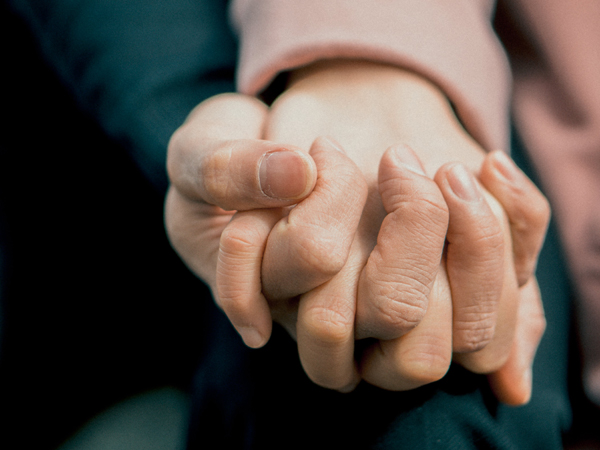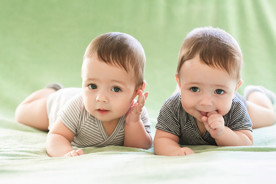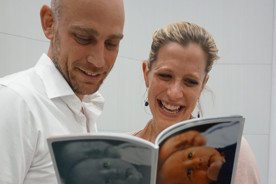Multiple pregnancies carry higher risks than singleton pregnancies and in labour extra measures are recommended to look after you and your babies. Whilst rare, multiple pregnancies can put women and their partners at higher risk of experiencing birth trauma.
On this page you can find information about:
- What is birth trauma?
- What makes a birth traumatic?
- Is the risk of birth trauma higher with multiples?
- Symptoms of postnatal PTSD
- Are Post Traumatic Stress Disorder (PTSD) and Postnatal Depression (PND) different?
- Where can I find support for birth trauma?
- Other organisations who can provide support
What is birth trauma?
Birth trauma is the name given to the symptoms of distress you might experience after going through, or witnessing, a traumatic birth(s).
Sometimes, these symptoms can be enough for a diagnosis of post-traumatic stress disorder (PTSD).
Research (available to read online) shows 4-5% of women, and 1% of partners, experience PTSD following a traumatic birth. Many more experience trauma symptoms such as anxiety and flashbacks, but not enough for a PTSD diagnosis. The term 'birth trauma' is still used for these cases.
What makes a birth traumatic?
There are lots of different reasons a birth can be traumatic; a difficult forceps birth, emergency c-section, postpartrum haemorrhage, a long labour, or a short and intense labour.
Multiples parents are at higher risk of miscarriage and stillbirth. Sometimes, a Termination for Medical Reasons (TFMR or Topfa) may be needed for one or more babies. This can mean carrying to term a baby who has passed away, to give the surviving baby or babies the best chance.
Your babies are also more likely to be born premature or ill. Having to spend time in NICU/special care can also be traumatising, as can being ill yourself after birth.
The stress of your birth may have resulted in a delay to your milk "coming in" by several days and breastfeeding may have also gotten off to a very rough start. You may have needed to supplement your babies with formula to get through this time. If breastfeeding didn't work out, for whatever reason, you may have experienced this as another significant loss—or even "failure".
You may feel disappointed that childbirth was not the experience you were hoping for, or feel angry with the medical staff if your delivery wasn't handled well. Your experiences may also make you feel anxious about having more babies in the future.
These traumatic experiences can potentially have a negative effect on your relationship with your babies and those around you, including your partner if you have one.

Is the risk of birth trauma higher with multiples?
Multiple pregnancies and births carry higher risks. Your babies are more likely to have been delivered on or before 37 weeks depending upon your pregnancy, in line with NICE guidelines, and your babies are more likely to have needed longer stays in NICU. There is also a higher risk of bereavement.
For these reasons, you are likely to have been advised to give birth at hospital. Often, multiple births require more medical interventions, such as induction, which can lead to a higher risk of you experiencing birth trauma. The Royal College of Obstetricians and Gynecologists state that those expecting twins, triplets or more have a higher chance of needing a caesarean birth or an assisted vaginal birth (forceps or ventouse). An assisted birth can result in episiotomy or 3rd and 4th degree tears. They also state that you may bleed more than average (post-partum haemorrhage).
This may be reflected in what you experienced, and you may have had a difficult recovery alongside looking after two or more babies.
Symptoms of postnatal PTSD
According to the Birth Trauma Association, there are four main symptoms of postnatal PTSD. These are:
- Re-experiencing the traumatic event through flashbacks, nightmares or intrusive memories. These make you feel distressed and panicky.
- Avoiding anything that reminds you of the trauma. This can mean refusing to walk past the hospital where you gave birth or avoiding meeting other women with new babies.
- Feeling hypervigilant: this means that you are constantly alert, irritable and jumpy. You worry that something terrible is going to happen to your babies.
- Feeling low and unhappy ("negative cognition" in the medical jargon). You may feel guilty and blame yourself for your traumatic birth. You may have difficulty remembering parts of your birth experience.
Because of the stress of living with PTSD, you or others may notice that you are:
- Feeling anxious and fearful a lot of the time.
- Keeping very busy to avoid intrusive thoughts.
- Finding it difficult to sleep.
- Feeling angry, upset, aggressive, irritable, physically and/or emotionally numb or detached from your feelings or body.
- Getting involved in destructive behaviours, such as excessive drinking, using drugs or forming a new relationship.
- Not feeling connected to your baby and/or
- Afraid of getting pregnant again.
Are Post Traumatic Stress Disorder (PTSD) and Postnatal Depression (PND) different?
While the symptoms of PTSD and PND might be similar, the two illnesses are different and may require different types of support and medication. Make sure that you are happy with your diagnosis and treatment plan.
Where can I find support for birth trauma?
If you feel you may be experiencing birth trauma and need support, please do not be afraid to ask for help. Healthcare professionals are increasingly sensitive to birth trauma.
If you experienced a difficult birth, you should be offered a birth debrief, sometimes called 'birth reflections', by your hospital. If this has not happened, you can ask for one. This will help you understand what happened and what steps you could take to prevent it from happening again.
If you recognise any of the symptoms of PTSD, make an appointment with your GP. Your GP can ensure you are referred for the right support. If you live in England, you can self-refer to mental health services through your local talking therapies service. You can also choose private therapy by searching on the register of the British Association of Counsellors and Psychotherapists. Charges for a private therapist tend to range from £40 to £150 an hour.
Our online community groups offer great peer-to-peer support. We have specific groups for parents with babies in neonatal units/parents who have been through that experience, as well as bereavement.
You can also call Twinline, our bespoke helpline for parents with multiples. Our helpline is open Monday to Friday, 10am to 1pm and 7pm to 10pm. All of our volunteers are parents of multiples.
If you are experience birth trauma, there are many organisations who can help. The Birth Trauma Association offers information and support, including peer-to-peer support.
Other organisations who can provide support
- Mind (mind.org.uk) is a mental health charity that provides crisis resources and also have a helpline.
- Bliss (bliss.org.uk) supports parents of premature or sick babies. They can offer emotional and practical support to families.
- PaNDAS (pandasfoundation.org.uk) is a community offering peer-to-peer support for you, your family and your network.
- Sands (sands.org.uk) offer support to bereaved families.
- Tommy's (tommys.org) provides information and research on the causes of stillbirth, premature birth and miscarriage.
-
Make Birth Better (www.makebirthbetter.org) offers support to both parents and professionals impacted by birth trauma.
-strap.svg)


